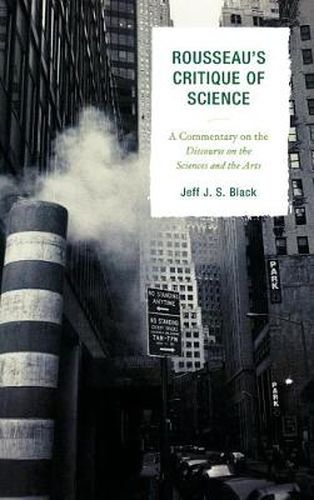Readings Newsletter
Become a Readings Member to make your shopping experience even easier.
Sign in or sign up for free!
You’re not far away from qualifying for FREE standard shipping within Australia
You’ve qualified for FREE standard shipping within Australia
The cart is loading…






Rousseau’s Critique of Science argues that the First Discourse is an indispensable work, both for those interested in understanding Rousseau’s philosophical system, and for those interested in the political consequences of the modern liberal democratic commitment to scientific progress. Through two simultaneous readings of the Discourse-a naive reading that examines Rousseau’s arguments in isolation, and a sophisticated reading that interprets these arguments in the light of Rousseau’s later systematic works-the commentary pursues answers to four questions, about the basis of Rousseau’s thesis that scientific progress contributes to moral corruption, about the origin and method of Rousseau’s philosophical system, about the place of the Discourse in Rousseau’s system, and about the consequences of Rousseau’s critique of science for the future happiness of mankind.
In this pursuit, the commentary follows the order of the Discourse itself, and is organized into two sections and nine chapters: an introduction; seven topical chapters, each treating a theme raised by the Discourse; and a conclusion. In answer to its four guiding questions, it concludes that Rousseau’s thesis is based on his understanding of the nature of the interaction of reason and vanity; that Rousseau’s system originates in introspection and is established by a non-historical method of analysis and synthesis; that the Discourse is an indispensable part of Rousseau’s system because it spells out the beginnings of this analysis and the conclusions of this synthesis, and through the limitations of its arguments points to the entire extent of his system; and that as a result Rousseau’s critique of science has much to teach us about the dangers involved in our political commitment to scientific progress, and about the ways in which the future happiness of mankind might be secured.
$9.00 standard shipping within Australia
FREE standard shipping within Australia for orders over $100.00
Express & International shipping calculated at checkout
Rousseau’s Critique of Science argues that the First Discourse is an indispensable work, both for those interested in understanding Rousseau’s philosophical system, and for those interested in the political consequences of the modern liberal democratic commitment to scientific progress. Through two simultaneous readings of the Discourse-a naive reading that examines Rousseau’s arguments in isolation, and a sophisticated reading that interprets these arguments in the light of Rousseau’s later systematic works-the commentary pursues answers to four questions, about the basis of Rousseau’s thesis that scientific progress contributes to moral corruption, about the origin and method of Rousseau’s philosophical system, about the place of the Discourse in Rousseau’s system, and about the consequences of Rousseau’s critique of science for the future happiness of mankind.
In this pursuit, the commentary follows the order of the Discourse itself, and is organized into two sections and nine chapters: an introduction; seven topical chapters, each treating a theme raised by the Discourse; and a conclusion. In answer to its four guiding questions, it concludes that Rousseau’s thesis is based on his understanding of the nature of the interaction of reason and vanity; that Rousseau’s system originates in introspection and is established by a non-historical method of analysis and synthesis; that the Discourse is an indispensable part of Rousseau’s system because it spells out the beginnings of this analysis and the conclusions of this synthesis, and through the limitations of its arguments points to the entire extent of his system; and that as a result Rousseau’s critique of science has much to teach us about the dangers involved in our political commitment to scientific progress, and about the ways in which the future happiness of mankind might be secured.